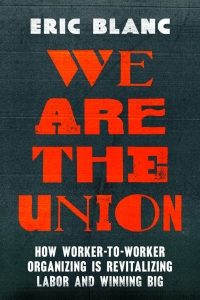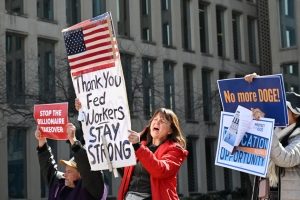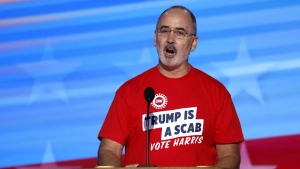FAIR (Fairness and Accuracy in Reporting) online interview with Eric Blanc, assistant professor of labor studies at Rutgers University, author of Red State Revolt: The Teacher Strike Wave and Working-Class Politics; We Are the Union: How Worker-to-Worker Organizing Is Revitalizing Labor and Winning Big . This piece has been lightly edited for space and clarity.
Eric Blanc: It’s hard to exaggerate the stakes of the fight right now around federal  workers.There’s a reason that Musk and Trump have started by trying to decimate federal services and decimate federal unions, and that’s because they understand that these are blockages on their attempt to have sort of full authoritarian control over the government and to be able to just impose their reactionary agenda irrespective of the law. And they know that they need to not just fire the heads of these agencies, but they need to be able to have a workforce that is so terrified of the administration that they’ll comply even when the law is being broken.
workers.There’s a reason that Musk and Trump have started by trying to decimate federal services and decimate federal unions, and that’s because they understand that these are blockages on their attempt to have sort of full authoritarian control over the government and to be able to just impose their reactionary agenda irrespective of the law. And they know that they need to not just fire the heads of these agencies, but they need to be able to have a workforce that is so terrified of the administration that they’ll comply even when the law is being broken.
And so they have to go out after these unions and break them. And in turn, the stakes for, really, all progressive, all working people, anybody who has a stake in democracy, are very high because this is the first major battle of the new administration. And if they’re able to mass fire federal workers despite their legal protections to have job protections, despite the reality that millions of Americans depend on these services—Social Security, Medicaid, just basic environmental health and safety protections—if they’re able to destroy these services upon which so many people depend, this is going to set a basis for them to then go even harder on the rest of society. So the implications of this battle are very high. It is the case, fortunately, that federal workers are starting to resist, but there’s going to need to be a lot more to be able to push back.
The basic response is straightforward, which is to highlight just how important these services are and to note that, far from having a massively expanded bureaucracy, the federal services, like most public services, have actually been starved over the last 50 years. The percentage of the workforce that works for the federal government has continued to decline for the last four decades. And so it’s just not the case that there’s this massively expanding bureaucracy. And if anything, many of the inefficiencies and the problems in the sector are due to a lack of resources and then the lack of ability to really make these the robust programs that they can and should be, and oftentimes in the past were.
So it’s just not the case that either there’s a massively expanded bureaucracy or that these services are somehow not important. The reality is that the American people, in some ways, don’t see all of these services. They take them for granted. They’re somewhat invisible. So the fact that, up until recently, planes weren’t crashing, well, that’s because you have federal regulators and have well-trained federal air traffic controllers. And so when you start to destroy these services, then all of a sudden it becomes more visible. What will happen if you stop regulating companies on pollution, for instance? Well, companies can go back and do what they did a hundred years ago, which is to systematically dump toxins into the soil, into water, and all of these other things that we almost take for granted now that are unacceptable. Well, if there’s no checks and balances on corporations, who’s going to prevent them from doing all of this?
And so I do think that there’s just a lot of basic education that needs to be put out there to counter these lies, essentially, of the Trump administration. For instance, the vast majority of federal workers don’t live in DC. This idea that this is all sort of rich bureaucrats in DC—over 80% of federal workers live all across the country, outside of DC. And just monetarily, it’s not the case these are people making hundreds of thousands of dollars, they’re making decent working class wages. Overwhelmingly, you can look at the data.
So we need to, I think, be really clear both of the importance of these services, but then also just to say it’s a complete myth that the reason that ordinary working class people are suffering is due to federal workers. It’s a tiny part of the federal budget, first of all, the payroll of federal workers. And if you just compare the amount of money that goes to federal workers to, say, the wealth of Elon Musk, there’s no comparison. Elon Musk, richest man on earth, has over $400 billion net worth. That’s almost double what federal workers, 2.3 million federal workers as a whole, make every year. So you just see the actual inequality is not coming from federal workers, it’s coming from the richest in our country and the world.
The example of the red state strikes are a prime indicator that even when you have very conservative people in power, in government, workers have an ability to use their workplace leverage and their community leverage to win.
And so in 2018, hundreds of thousands of teachers in West Virginia, Oklahoma, Arizona and beyond went on strike. Even though those strikes were illegal, even though these were states in which the unions are very weak, right-to-work states, and even though the electorates in all of these states had voted for Donald Trump, nevertheless they got overwhelming support from the population because they had very simple, resonant demands, like more funding for schools, decent pay for teachers, making sure that there’s enough money so that students can get a decent education.
These things cut across partisan lines in a way that, similarly, I think that the defense of basic services like Social Security and Medicaid today really does cut across party lines. And the tactics, then, that they used were, well, first they had to get over the fear factor, because these were illegal strikes, so they had to find ways to start generating momentum amongst teachers. They did things like really basic escalating actions like asking people to wear red on one day. So they didn’t start by saying, “Let’s go on strike.” They said, “Can you do this one simple action together? Can we all wear the same color on a given day?” And then they asked the community to come in. They said, “Community members, can you meet us after school on this day? We’re going to talk about our issues together. We’re going to hold up some signs. We’re going to provide some information.”
So they built with escalating action towards eventually a mass strike. And they used a lot of social media because they couldn’t rely on the unions as much. Social media was very important for connecting workers across these states, for generating momentum. And eventually they were able to have extremely successful walkouts that, despite being illegal, nobody got retaliated against. They won, they forced the government to back down and to meet their demands. And so I do think that that is more or less the game plan for how we’re going to win around Musk and Trump. You have to essentially create enough of a backlash of working people, but then in conjunction with the community, that the politicians are forced to back down.
The basic problem with more traditional, staff-intensive unionism is that it’s just too expensive. It’s too costly, both in terms of money and time, to win big, to organize millions of workers. And whether it’s on offensive battles like unionizing Starbucks or Amazon, or whether it’s defensive battles right now, like defending federal workers, if you’re going to organize enough workers to fight back, there’s just not enough staff to be able to do that. And so part of the problem with the traditional method is that you just can’t win widely enough. You can’t win big enough.
Worker-to-worker organizing is essentially the form of organizing in which the types of roles that staff normally do are taken on by workers themselves. So strategizing, training and coaching other workers, initiating campaigns—these are things that then become the task and responsibility of workers themselves with coaching and with support, and oftentimes in conjunction with bigger unions. But workers just take on a higher degree of responsibility, and that has been shown to work. The biggest successes we’ve had in the labor movement in recent years, from the teacher strikes to Starbucks, which has organized now over 560 stores, forced one of the biggest companies in the world to the bargaining table. We’ve seen that it works.
And it’s just a question now of the rest of the labor movement really investing in this type of bottom-up organizing. And frankly, there is no alternative. The idea that so many in the labor leadership have, that we’re just going to elect Democrats and then they’ll turn it around—well, Democrats are sort of missing in action, and who knows when they’re going to come back into power. And so it’s really incumbent on the labor movement to stop looking from above and start looking, really, to its own rank and say, “Okay, if we’re going to save ourselves, that’s the only possible way. No one’s going to come save us from above.”
Workers are best placed to understand each other’s issues. They’re also the best placed to convince other workers to get on board. One of the things bosses always say whenever there’s a union drive or union fight is, “Oh, the union is this outside third party.” And sometimes there’s a little bit of truth to that. I don’t want to exaggerate the point, but there could be an aspect of the labor movement that can feel a little bit divorced from the direct ownership and experiences of workers. But when workers themselves are organizing, oftentimes in conjunction with unions, if they really are the people in the lead, then it becomes much harder for the bosses to third-party the union because it’s clear the union is the workers.
I think that the Biden NLRB was very good and it helped workers unionize. So the fact that we don’t have that kind of NLRB anymore is a blow to the labor movement. I think we just have to acknowledge that. That being said, it’s still possible to unionize. You don’t need the NLRB to unionize. The labor movement grew and fought for many years before labor law was passed. And even today it’s very ambiguous. The NLRB is sort of paralyzed on a national level, but on a local level you can still run elections. And so it’s not even completely defunct. And I think it’s probably still possible to use it to a certain extent.
But the reality is that the legal terrain is harder than it was. On the other hand, the urgency is even higher, and you still see workers fighting back and organizing in record numbers. I’ve been really heartened by, despite the fact that the legal regime is harder, you’ve had some major union victories just in the last few weeks under Trump. For instance, in Philadelphia, Whole Foods workers unionizeddespite Trump, despite an intense union busting campaign coming straight on down from Jeff Bezos. This was only the second time Amazon—because Amazon’s the owner of Whole Foods now—has lost a union election, and that was just a few weeks ago in Philadelphia.
And so it shows that there is this real anger from below. And I think that there’s something, actually, about the Trump administration, that because it’s so fused to some of the richest people on earth with the administration in an oligarchic manner, but then unionization itself becomes almost a direct way to challenge the Trump regime. Because you’re going up against both their destruction of labor rights, and then also, frankly, it’s just the same people are up top. The bosses and the administration are almost indistinguishable at this point.
I think that the Achilles heel of Trump and his whole movement is that it claims to be populist and it appeals to working class people, but in reality is beholden to the richest people on the planet. So the best way to expose that is by waging battles around economic dignity. And the labor movement is the number one force that can do that, and force the politicians to show which side they’re on. Are you on the side of Jeff Bezos or are you on the side of low wage workers who are fighting back? Waging more and more of those battles, even if it’s harder because of the legal regime, I think is going to be one of the most crucial ways we have to undermine the support of MAGA amongst working people of all backgrounds.
One of the reasons why the right has made the inroads it has is that it’s been better at getting its story out there and waging the battles of ideas through the media, through social media, and through more mainstream media. And frankly, our side has trailed. Maybe it’s because we don’t have the same resources, but I think it’s also there’s an underestimation of how important it is to explain what is going on in the world, to name who the real enemies are, and to provide an explanation for people’s real anger and their real anxiety about what’s happening. I think it’s absolutely crucial. And I think we need to, as a labor movement, as progressives, as left, really push back and provide an alternative explanation that all of these problems are rooted in the power of billionaires. It’s not rooted because of the immigrants, not because of the federal workers, not because of trans kids.
And I’ll just say that one of the things I find to be hopeful is that social media is being used pretty effectively now by this new federal workers movement, which is that they have a new website, go.savepublicservices.com, through which anybody can sign up to get involved in the local actions happening nearby. It’s going to be a rapid response network to stop all of the layoffs that happen locally, wherever you live, and to save the services on which we depend. So people can go to that website, go.savepublicservices.com, and take advantage of that media opportunity to get involved locally.
FAIR website, 2/13


 workers.There’s a reason that Musk and Trump have started by trying to decimate federal services and decimate federal unions, and that’s because they understand that these are blockages on their attempt to have sort of full authoritarian control over the government and to be able to just impose their reactionary agenda irrespective of the law. And they know that they need to not just fire the heads of these agencies, but they need to be able to have a workforce that is so terrified of the administration that they’ll comply even when the law is being broken.
workers.There’s a reason that Musk and Trump have started by trying to decimate federal services and decimate federal unions, and that’s because they understand that these are blockages on their attempt to have sort of full authoritarian control over the government and to be able to just impose their reactionary agenda irrespective of the law. And they know that they need to not just fire the heads of these agencies, but they need to be able to have a workforce that is so terrified of the administration that they’ll comply even when the law is being broken.

